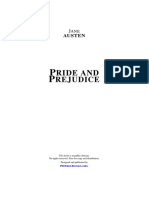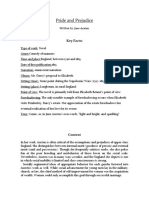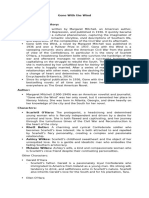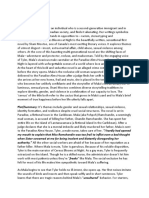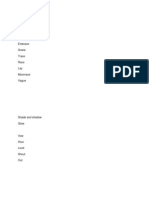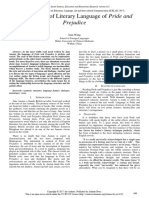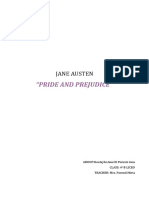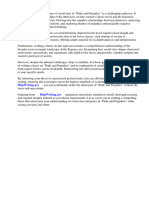Lit Test
Lit Test
Uploaded by
Chu Hòa BìnhCopyright:
Available Formats
Lit Test
Lit Test
Uploaded by
Chu Hòa BìnhOriginal Title
Copyright
Available Formats
Share this document
Did you find this document useful?
Is this content inappropriate?
Copyright:
Available Formats
Lit Test
Lit Test
Uploaded by
Chu Hòa BìnhCopyright:
Available Formats
Scarlett did not realize that all the rules of the game had been changed and that
honest labour could no longer earn its just reward. "In the end what will happen will be what has happened whenever a civilization breaks up. The people who have brains and courage come through and the ones who haven't are winnowed out." -Margaret Mitchell, Gone With the Wind, Ch. 31 under threat of starvation and even death, she is determined to survive and does so by picking cotton, running her entire plantation, forging a successful business, and even killing a man. Hunger gnawed at her empty stomach again and she said aloud: 'As God is my witness, and God is my witness, the Yankees aren't going to lick me. I'm going to live through this, and when it's over, I'm never going to be hungry again. No, nor any of my folks. If I have to steal or kill - as God is my witness, I'm never going to be hungry again.'" Gone With the Wind, Ch. 25 Im going to have money enough so the Yankees can never take Tara away from me Youve never had the Carpetbaggers trying to drive you out. Youve never been cold and ragged and had to break your back to keep from starving. A startling thought this, that a woman could handle business matters as well or better than a man, a revolutionary thought to Scarlett who had been reared in the tradition that men were omniscient and women none too bright. Archie turned to her, his eye malevolent, and he spoke there was cold anger in his rusty voice. I calls it convict murderin. Buying men like they was mules. Treatin them worse than mules ever was treated. Beatin; them, starvin them, killin them. And who cares? The State dont care. Its got the lease of money. The folks that gits the convicts, they dont care. All they want is to feed them cheap and git all the work they can out of them. Scarlett alienates much of Southern society with her "unwomanly" behavior and unscrupulous business practices, but does not care for the opinions of others. The only person who both sees her for what she is and loves her is Rhett Butler, who becomes her third husband. Scarlett and Rhett have a daughter, Bonnie, who becomes their favorite child. 2. How does Mitchell portray black people and slavery in the novel? In Gone with the Wind, Mitchell writes about slavery from the perspective of Southern plantation owners. She depicts house slaves like Mammy and Pork as devoted and loving servants whom the whites treat like family. In the novel, all masters treat all slaves well. Although some admirable characters dislike slavery, Ashley and Frank among them, once the slaves are freed both the characters and the narrator describe blacks as trashy, insolent, and creatures of small intelligence. Slaves and free blacks are often described as animals and compared to monkeys and dogs. All exConfederates in Scarletts circle belong to the Ku Klux Klan, and both Tony Fontaine and Rhett kill a black man with no feelings of remor se or guilt. Mitchell paints a historically accurate picture of the brutal treatment of freed slaves, but she provides an extremely unrealistic picture of the way slaves were treated before emancipation. While some white owners treated their slaves well, the rampant abuse of slaves in the South is will documented. The characters contempt for freed slaves can be interpreted as a realistic depiction of Civil Warera racism, but the narrators racist attitude toward black people cannot be excused so easily. By current standards, the novel is shockingly racist. By the standards of Mitchells time, the novels portrait of race relations is typical. Mitchell published her novel in the 1930s, when white acceptance of overt racism was not uncommon. 3. How does Scarlett represent the South in the novel? How do the narratives of Scarlett and the South parallel each other through the novel?
From the beginning of the novel, Scarlett is a mixture of old and new. Her mother, Ellen, comes from an established aristocratic family and her father, Gerald, is a self-made immigrant. Scarlett admires her mothers refined manners and quiet strength, and she longs to please her, but this desire frequently conflicts with the strong, independent spirit Scarlett has inherited from Gerald. As Scarlett grows and society around her changes, she becomes less refined and more strong-willed. Before the war, Scarlett obeys nearly all the rules of high-class Southern society, even the ones she finds unnatural. When the war begins, though, Scarlett finds that the social code relaxes, and she begins to indulge her natural instinct to break rules. Additionally, rule-breakers like Rhett become crucial to the Souths survival. Scarlett becomes increasingly heedless of social mores after she returns to manage Tara and the South loses ground in the war. She becomes self-reliant and business-savvy, traits that would be shocking in an Old South woman but that ensure Scarletts survival in the New South. During Reconstruction, Scarlett buys a sawmill and socializes with the Northerners in power, thumbing her nose at the rules of the Old South. Scarletts journey from prewar belle to scrappy survivor to hardened opportunist parallels the journey of Southern culture before, during, and after the Civil War. After the corrupt period of Reconstruction, Scarlett goes back to Tara to regain her heritage, reclaiming her Old Southern roots but tempering them with new experience. So too does her Southern culture regain control of its political structures and rebuild a society that mixes the old world with the new one. 4. Discuss the various factors on the parts of both Scarlett and the women of Atlanta that contribute to Scarletts alienation She knew she has changed too, but not as they changed, and it puzzled her. She said and watched them and she felt herself an alien among them, as alien and lonely as if she had come from another world, speaking a language they did not understand and she not understanding theirs. Then she knew that this feeling was the same one she felt with Ashley. With him and with people of his kind- and they made up most of her world- she felt outside of something she could not understand. But, no matter what sights they had seen, what mental tasks they had done and would have to do, they remained ladies and gentlemen, royalty in exile- bitter, aloof, incurious, kind to one another, diamond-hard, as bright and brittle as the crystals of the broken chandelier over their heads She could not ignore life. She had to live it and it was too brutal, too hostile, for her even to try to gloss over its harshness with a smile. Or the sweetness and courage and unyielding pride of her friends, Scarlett saw nothing. She saw only a silly stiff-neckedness which observed facts but smiled and refused to look them in the face. 1. Jane Austens original title for the novel was First Impressions. What role do first impressions play in Pride and Prejudice? Answer for Study Question 1 >> Pride and Prejudice is, first and foremost, a novel about surmounting obstacles and achieving romantic happiness. For Elizabeth, the heroine, and Darcy, her eventual husband, the chief obstacle resides in the books original title: First Impressions. Darcy, the proud, prickly noblewomans nephew, must break free from his original dismissal of Elizabeth as not handsome enough to tempt me, and from his class-based prejudice against her lack of wealth and family connections. Elizabeths first impressions, meanwhile, catalogue Darcy as arrogant and self-satisfied; as a result, she later accepts slanderous accusations against him as true. Both Elizabeth and Darcy are forced to come to grips with their own initial mistakes. Structurally, the first half of the novel traces Darcys progression to the point at which he is able to admit his love in spite of his prejudice. In the second half, Elizabeths mistaken impressions are supplanted by informed realizations about Darcys true character. Darcys two proposals to Elizabeth chart the mature development of their relationship. He delivers the first at the mid-point of the novel, when he has realized his love for Elizabeth but has not yet escaped his prejudices against her family, and when she is still in the grip of her first, negative impression of him. The second proposal in which Darcy humbly restates his love for her and Elizabeth, now with full knowledge of Mr. Darcys good character, happily acceptsmarks the arrival of the two characters, each finally achieving the ability to view the other through unprejudiced eyes. 2. Analyze how Austen depicts Mr. Bennet. Is he a positive or negative figure? Answer for Study Question 2 >> I think Mr. Bennet is a negative figure. Mr. Bennet is an ironic person. And he is also very sharp and cl ever. But to associate the authors point of view with that of Mr. Bennet, however, is to ignore his ulti
mate failure as a father and husband. He is very clever, but he always keeps away from the matters tha t occur around him. And that makes him an ineffective parent and husband. He makes no advice to hi s wife and little daughters bad manners, so that his wife and his little daughters always behave ridicul ously and even badly. After Lydia elopes with Wickham, Mr. Bennet proves unable to handle the situat ion. Thanks to Darcy and Gardiners, the elopement has been solved. He is a likable, entertaining chara cter, but he never manages to earn the respect of the reader. So he is a negative figure. Mr. Bennets chief characteristics are an ironic detachment and a sharp, cutting wit. The distance that he creates between himself and the absurdity around him often endears him to the reader and parallels the amused detachment with which Austen treats ridiculous characters such as Mr. Collins and Lady Catherine. To associate the authors point of view with t hat of Mr. Bennet, however, is to ignore his ultimate failure as a father and husband. He is endlessly witty, but his distance from the events around him makes him an ineffective parent. Detached humor may prove useful for handling the Mr. Collinses of the world, but it is helpless against the depredations of the villainous (but likable) Wickham. When the crisis of Lydias elopement strikes, Mr. Bennet proves unable to handle the situation. Darcy, decent and energetic, and the Gardiners, whose intelligence, perceptiveness, and resourcefulness make them the strongest adult force in the novel, must step in. He is a likable, entertaining character, but he never manages to earn the respect of the reader. 3. Discuss the importance of dialogue to character development in the novel. Answer for Study Question 3 >> All of Austens many characters come alive through dialogue, as the narrative voice in Austens work is secondary to the voices of the characters. Long, unwieldy speeches are rare, as are detailed physical descriptions. In their place, the reader hears the crackle of quick, witty conversation. True nature reveals itself in the way the characters speak: Mr. Bennets emotional detachment comes across in his dry wit, while Mrs. Bennets hysterical excess drips from every sentence she utters. Austens dialogue often serves to reveal the worst aspects of her charactersMiss Bingleys spiteful, snobbish attitudes are readily apparent in her words, and Mr. Collinss long-winded speeches (and occasional letters, which are a kind of secondary dialogue) carry with them a tone-deaf pomposity that defines his character perfectly. Dialogue can also conceal bad character traits: Wickham, for instance, hides his rogues heart beneath the patter of pleasant, witty banter, and he manages to take Elizabeth in with his smooth tongue (although his good looks help as well). Ultimately, though, good conversational ability and general goodness of personality seem to go hand in hand. It is no accident that Darcy and Elizabeth are the best conversationalists in the book: Pride and Prejudice is the story of their love, and for the reader, that love unfolds through the words they share.
Prudence vs. Inclinations In the novel, Pride and Prejudice, Elizabeth and Jane both achieve lasting happiness with their respective partners -Darcy and Bingley, after a series of misjudgments, misunderstandings and obstacles. Indeed the Elizabeth' s tumultuous relationship with Darcy forms the bulk of the novel, and the focal point of interest for the reader while Jane's relationship with Bingley adds variety and interest to the novel. Elizabeth's and Darcy's relationship is filled with trials and tribulations, misjudgments and prejudice, e ventually culminating in a blissful union of two complementary souls. Their relationship begins at an inau spicious starting point when they first meet at the Meryton assembly, with both receiving unfavourable fir st impressions. Elizabeth thinks Darcy a proud, cold man as a result of his reserve and his slighting her. Her assessment of his character, given her limited exposure to him, in those unfortunate circumstances is most natural and understandable. Darcy, on the other hand, is to be blamed for his lack of prudence and his pride, which leads him to criti cize Elizabeth most unfairly in that first encounter. This indeed, jeopardizes his prospects of a lasting happiness with Elizabeth, as he leaves an indelible first impression which colours Elizabeth's later judge ments of his character. However, as the novel progresses, Darcy shows enough flexibility and good sense to change his opinion of E lizabeth. Thus, his first inclination of scorning her is erased as he becomes enamoured of Elizabeth as a
result of her witty intelligence and spirit, such that he began to find that "her eyes were rendered uncom monly intelligent by the beautiful expression." After repeated meetings and verbal parries with Elizabeth, Darcy's first impression of her is completely replaced by ardent affection, as he sees her in a comrade s pirit. It is his prudent judgement and flexibility which temper his inclination to corn and criticize, suc h that he is able to recognize in Elizabeth a worthy wife and companion, despite her social standing and L ydia's elopment. Therefore, we must credit his prudent judgement for his remarkable change in opinion, whi ch paves the way for his future happiness with Elizabeth. Unfortunately, Elizabeth displays little of her prudent judgement and astute assessment with regard to Dar cy. It is for this singular reason that her relationship with Darcy is fraught with difficulty. After her first meeting with Darcy, Elizabeth determinedly preserves her prejudice against Darcy, even after repeate d incidents which attest to his credibility of character, displaying uncharacteristic lack of intelligent and careful judgement. When Elizabeth meets Wickham, she is immediately won over by his appearance and suave charm, and is wholeheartedly inclined to believe his every word, simply because his amiable manners and looks. This rash incl ination results in her being even more convinced of Darcy's unworthiness of character. In spite of the fac t that Wickham sullies Darcy's family in front of a comparative stranger, after declaring himself determin ed to honour the late Mr. Darcy's reputation, and that he purposely avoids Darcy at the Netherfield ball, after stating staunchly that he is not afraid of meeting Darcy, and would fear no confrontation with him. Elizabeth sees no reason to doubt him. Her brash inclinations to Wickham justify his merrcenary pursuit of Mary King, even as she condemns Bingley for abandoning Jane for the socially advantageous Georgina Darcy. She discredits Bingley's opinion of Darcy and Miss Bingley's warning against Wickham, and refuses to temp er her first impressions with any objectivity, even after Jane, who sees only good in everyone, has confes sed. Her lack of discernment precipitates her harsh refusal of Darcy's initial proposal, jeopardising unwi sely her possible happiness with him. It is only when Elizabeth reads Darcy's letter that she is forced to face the truth, to acknowledge that she has been utterly wrong, and has completely misjudged Darcy. After his monumental unveiling of the truth, Elizabeth's former dislike of Darcy is reversed, and after a few more obstacles (Lydia's engagement), they reveal their mutual affection for each other, and are joined in a joyful union. Austen's portrayal of the heroine of this novel with her fallibilities and flawed judgement, do not simply add to the intrigues of the plot, but also reveal, ironically, that even the most astute studier of chara cter can be mistaken and that inclinations must always be tempered with prudent judgement, for lasting hap piness to ensue. Elizabeth's illfounded accusation towards Darcy and his initial brash criticism are testament to the necessity of prudent judgement and flexibility for a happy union. In contrast, Jane and Bingley's relationship proves that too much of prudent judgement can damage, most se verely, the possibility of lasting happiness. The two characters are immediately charmed by each other at the Meryton assembly. Jane's prudent judgement and utmost caution are apparent from the beginning of their relationship, and it is this factor which proves most damaging to any blissful future prospects, whilst E lizabeth is pleased that Jane displays caution. Charlotte Lucas is surprising accurate in her declaration that less prudent judgement is required It is Jane's guardedness which is the sole reason for Bingley and the Netherfield party leaving the countr y, as he is so "modest" that her apparent lack of affection had led him to trust in Darcy's advice and to leave. Jane has completely hidden her inclinations of affection for Bingley beneath her prudent judgement and distance, such that his affection is not encouraged, but is crushed, and any prospect of marriage seem s an impossibility. It is only after Elizabeth has revealed to Darcy her sister's feelings that Jane reali zes her own fault in his leaving her, that is, she appears as being indifferent to Binley, which would hav e prevented his coming down again. Thus, Jane's excessive prudence and caution would have ruined her lasti
ng happiness had not Elizabeth revealed her affection. Bingley, on the other hand, is not hampered by excessive prudent judgement in his following his inclinatio ns and courting Jane, and it is his active approach in wooing Jane which eventually precipitates a joyous marriage. In her portrayal of Jane and Bingley's relationship, Austen provides a counterpoint to Elizabeth and Darcy 's relationship by showing that an excessive amount of prudent judgement and caution can so much temper in clinations, such that with so little encouragement offered, prospects of lasting happiness can be endanger ed and lost. Through these two contrasting relationships, Jane Austen has skillfully drawn the fine line between too mu ch of prudent judgement, because a rash, prejudiced approach towards inclinations, showing that a delicate balance of objective neutrality and strength of feeling under the appropriate circumstances must be demon strated, in order to nurture any relationship, and to ensure its success.
You might also like
- Austen, Jane. Pride and Prejudice.Document226 pagesAusten, Jane. Pride and Prejudice.PDFreeBooks.org100% (22)
- Jane Austen - Pride and PrejudiceDocument21 pagesJane Austen - Pride and PrejudiceНаталия КарбованецNo ratings yet
- Pride and Prejudice ScriptDocument25 pagesPride and Prejudice ScriptLaura JaszczNo ratings yet
- Portfolio VHAMDocument19 pagesPortfolio VHAMLê Mai LinhNo ratings yet
- 国外-飘中形象和矛盾Document3 pages国外-飘中形象和矛盾q8jmqkqjysNo ratings yet
- Gone with the Wind by Margaret Mitchell (Book Analysis): Detailed Summary, Analysis and Reading GuideFrom EverandGone with the Wind by Margaret Mitchell (Book Analysis): Detailed Summary, Analysis and Reading GuideNo ratings yet
- Paper 4102 4110 Du ConfirmedDocument6 pagesPaper 4102 4110 Du ConfirmedElla CelineNo ratings yet
- Irony in Gone With The WindDocument4 pagesIrony in Gone With The WindElaRusNo ratings yet
- Reviews Pride and PrejudiceDocument2 pagesReviews Pride and Prejudicekeanne.gomezNo ratings yet
- Tomorrow Is Another Day: Gone With The Wind Is One of The Most Popular Novels in American History. Published inDocument9 pagesTomorrow Is Another Day: Gone With The Wind Is One of The Most Popular Novels in American History. Published inPhuong Lien PhamNo ratings yet
- 16 2313790054 BUI LINHDocument11 pages16 2313790054 BUI LINHlinhbn07.dynamicftuNo ratings yet
- Appunti Quarta Superiore Inglese 6 - Romantic Fiction - JANE AUSTEN-MARY SHELLEYDocument6 pagesAppunti Quarta Superiore Inglese 6 - Romantic Fiction - JANE AUSTEN-MARY SHELLEYm.sole.lombardiNo ratings yet
- A Streetcar Named Desire by Tennessee Williams (Book Analysis): Detailed Summary, Analysis and Reading GuideFrom EverandA Streetcar Named Desire by Tennessee Williams (Book Analysis): Detailed Summary, Analysis and Reading GuideRating: 4 out of 5 stars4/5 (1)
- Pride and Prejudice!!Document6 pagesPride and Prejudice!!MauricioNappaNo ratings yet
- 国外-多好的女人 斯嘉丽反叛精神Document3 pages国外-多好的女人 斯嘉丽反叛精神q8jmqkqjysNo ratings yet
- Charlote Bronty - Janeeyre Thomas Hardy - Tess of The D'UbervillesDocument3 pagesCharlote Bronty - Janeeyre Thomas Hardy - Tess of The D'Ubervillesdragostil88No ratings yet
- Gone With the WindDocument11 pagesGone With the WindjanesherenepapellerasNo ratings yet
- GONE-WITH-THE-WIND-FDocument6 pagesGONE-WITH-THE-WIND-FJessa Mae GaculaNo ratings yet
- Gone With The WindDocument5 pagesGone With The WindShekinah Joy PinedaNo ratings yet
- Wide Sargasso Sea Is A Postcolonial Novel in Which The Female Protagonist BecomesDocument9 pagesWide Sargasso Sea Is A Postcolonial Novel in Which The Female Protagonist BecomesNABEEL AHMED MINHASNo ratings yet
- 2 Chung Chin Yi July 2014Document14 pages2 Chung Chin Yi July 2014Casdfsfs100% (1)
- Tennessee WilliamsDocument26 pagesTennessee Williamsdev.hellfireeNo ratings yet
- Cereus Blooms at NightDocument4 pagesCereus Blooms at NightPriyam PaulNo ratings yet
- Pride and PrejudiceDocument15 pagesPride and PrejudiceKathleen AcadsNo ratings yet
- Senior PaperDocument10 pagesSenior Paperapi-285590247No ratings yet
- Tess of The D'Urberville: A Novel by Thomas HardyDocument18 pagesTess of The D'Urberville: A Novel by Thomas HardyMartina OsellaNo ratings yet
- Creating Extraordinary Characters: A Practical Approach to CharacterizationFrom EverandCreating Extraordinary Characters: A Practical Approach to CharacterizationNo ratings yet
- Presentation On A Streetcar Named DesireDocument22 pagesPresentation On A Streetcar Named DesireTeodora Murdzoska0% (1)
- Go Set a Watchman by Harper Lee (Book Analysis): Detailed Summary, Analysis and Reading GuideFrom EverandGo Set a Watchman by Harper Lee (Book Analysis): Detailed Summary, Analysis and Reading GuideNo ratings yet
- The Scarlet Letter and The Great Gatsby From The Marxist and Feminist PerspectivesDocument3 pagesThe Scarlet Letter and The Great Gatsby From The Marxist and Feminist PerspectivesAidan DonovanNo ratings yet
- Book Review: Submitted byDocument21 pagesBook Review: Submitted byMissbah NazirNo ratings yet
- Gone With The Wind - AnalysisDocument8 pagesGone With The Wind - AnalysiselejanronamaelNo ratings yet
- Elt4 - Final ReflectionDocument28 pagesElt4 - Final ReflectionSandra Mae Endencio EllamaNo ratings yet
- Austen - Pride and Pedjudice AnalysisDocument2 pagesAusten - Pride and Pedjudice Analysisphantom26No ratings yet
- An Intelligent FemaleDocument8 pagesAn Intelligent Femaleapi-254633306No ratings yet
- Tess'Document4 pagesTess'Shirin AfrozNo ratings yet
- A Comparative Study of Female Representation Between: Pride and Prejudice and Great ExpectationsDocument8 pagesA Comparative Study of Female Representation Between: Pride and Prejudice and Great ExpectationsAbtahee Hazzaz100% (1)
- Three Novels of New York: The House of Mirth, The Custom of the Country, The Age of Innocence (Penguin Classics Deluxe Edition)From EverandThree Novels of New York: The House of Mirth, The Custom of the Country, The Age of Innocence (Penguin Classics Deluxe Edition)Rating: 4 out of 5 stars4/5 (507)
- AssignmentDocument5 pagesAssignmentvenikasharma14No ratings yet
- GenderDocument4 pagesGenderberenice.lootenNo ratings yet
- A Streetcar Named Desire - Study QuestionsDocument3 pagesA Streetcar Named Desire - Study QuestionsZandru Yamanay50% (2)
- Pride and PrejudiceDocument11 pagesPride and Prejudiceabdulwahad298No ratings yet
- The Treatment of Love in Wuthering Heights and Great ExpectationsDocument7 pagesThe Treatment of Love in Wuthering Heights and Great ExpectationsAmani Shourbaji100% (3)
- Gone With The WindDocument2 pagesGone With The WindpreciousjulietfelizardoNo ratings yet
- NovelDocument14 pagesNovelSweetu RkNo ratings yet
- The Way of the World long-1Document5 pagesThe Way of the World long-1Kiran HemramNo ratings yet
- The Concept of Purity in Tess D'urbervilleDocument14 pagesThe Concept of Purity in Tess D'urbervilleBianca DarieNo ratings yet
- Prejudice: Austen'S Use of Irony in Pride andDocument5 pagesPrejudice: Austen'S Use of Irony in Pride andSabnaj SarkarNo ratings yet
- Female FriendsDocument4 pagesFemale Friendsneha rahmanNo ratings yet
- The Contrast: Gender Analysis Essay On America's First PlayDocument7 pagesThe Contrast: Gender Analysis Essay On America's First Playabbyleigh67100% (1)
- Crème Cake: Custard FillingDocument1 pageCrème Cake: Custard FillingChu Hòa BìnhNo ratings yet
- Ny - GDP.MKTP - CD Indicator en Excel v2Document140 pagesNy - GDP.MKTP - CD Indicator en Excel v2Chu Hòa BìnhNo ratings yet
- Youth CrimeDocument1 pageYouth CrimeChu Hòa BìnhNo ratings yet
- Reduction in Real Wages - To Make Exports More Competitive, To Stem InflationaryDocument2 pagesReduction in Real Wages - To Make Exports More Competitive, To Stem InflationaryChu Hòa BìnhNo ratings yet
- Business Vocabulary For IELTS Compete - An Example of Word FormationDocument5 pagesBusiness Vocabulary For IELTS Compete - An Example of Word FormationChu Hòa BìnhNo ratings yet
- Pride and Prejudice Quiz 1Document8 pagesPride and Prejudice Quiz 1Chu Hòa BìnhNo ratings yet
- The Man Booker PrizeDocument2 pagesThe Man Booker PrizeChu Hòa Bình100% (1)
- Day Gray May Ray Embrace Grace Trace Race Lay Moonrace VagueDocument1 pageDay Gray May Ray Embrace Grace Trace Race Lay Moonrace VagueChu Hòa BìnhNo ratings yet
- Module 41Document4 pagesModule 41Chu Hòa BìnhNo ratings yet
- Jane Austen - Pride and PrejudiceDocument313 pagesJane Austen - Pride and PrejudiceYasmin M. Abo ElazmNo ratings yet
- Assignment of NovelDocument6 pagesAssignment of NovelMastermind SunnyNo ratings yet
- Pride and Prejudice ScriptDocument86 pagesPride and Prejudice ScriptIqbhalMif100% (2)
- Pride and Prejudice VocabularyDocument11 pagesPride and Prejudice VocabularyDiego Alejandro CabreraNo ratings yet
- Rezumat Pride and PrejudiceDocument13 pagesRezumat Pride and Prejudiceana100% (1)
- Pride and Prejudice List of Main CharactersDocument4 pagesPride and Prejudice List of Main CharactersKaye BaloranNo ratings yet
- Pride and Prejudice A. QuestionsDocument8 pagesPride and Prejudice A. QuestionsJudith LatayanNo ratings yet
- Appreciation of Literary Language of Pride And: PrejudiceDocument6 pagesAppreciation of Literary Language of Pride And: Prejudicepriya gulliyaNo ratings yet
- Chapter One Pride&Prejudice: Setting The Bennet HouseholdDocument1 pageChapter One Pride&Prejudice: Setting The Bennet HouseholddaliaNo ratings yet
- RT PridePrejudice NeuDocument6 pagesRT PridePrejudice Neucrispu25No ratings yet
- Document (21) - 1Document13 pagesDocument (21) - 1chomuop007No ratings yet
- Pride and Prejudice - NotesDocument15 pagesPride and Prejudice - NotesKNo ratings yet
- Rabindranath TagoreDocument18 pagesRabindranath Tagorestella,engoziNo ratings yet
- Pride and Prejudice - Quiz 2 StsDocument1 pagePride and Prejudice - Quiz 2 StsKiseki ArinidaNo ratings yet
- Pride and Prejudice Irony AssignmentDocument4 pagesPride and Prejudice Irony Assignmentuser1378100% (2)
- Diploma Work On British Literature TopicDocument14 pagesDiploma Work On British Literature TopicEmilija MitevskaNo ratings yet
- English 10th ProseDocument11 pagesEnglish 10th Prosemirsabiq04No ratings yet
- Pride and PrejudiceDocument278 pagesPride and Prejudicehana하아No ratings yet
- Pride and Prejudice FinDocument51 pagesPride and Prejudice FinAMEL BOUTAYBINo ratings yet
- Pride and Prejudice Social Class ThesisDocument8 pagesPride and Prejudice Social Class Thesistonyastrongheartanchorage100% (2)
- Comment On The Use of Journal Entries in Robinson Crusoe and The Letters in Pride and Prejudice.Document8 pagesComment On The Use of Journal Entries in Robinson Crusoe and The Letters in Pride and Prejudice.Zubair AhmedNo ratings yet
- Pride and PrejudiceDocument5 pagesPride and PrejudiceSneha MichaelNo ratings yet
- Study Scheme English For MADocument55 pagesStudy Scheme English For MANehal KhanNo ratings yet
- Pride and PrejudiceDocument196 pagesPride and PrejudiceBrad TennentNo ratings yet
- wuolah-free-NARRATIVA - Pride and Prejudice-1Document17 pageswuolah-free-NARRATIVA - Pride and Prejudice-1Aqsa ZoniaNo ratings yet
- CharacterisationDocument29 pagesCharacterisationKornelia NitaNo ratings yet
- AssinmentDocument4 pagesAssinmentBurhan KambohNo ratings yet
- Pride and PrejudiceDocument15 pagesPride and PrejudiceKathleen AcadsNo ratings yet
